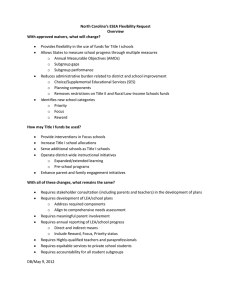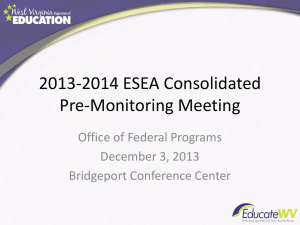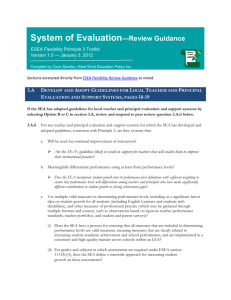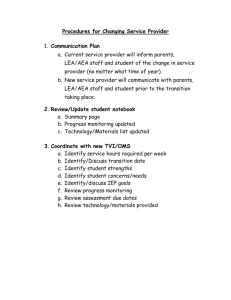2013-2014 ESEA Consolidated Monitoring Office of Federal Programs
advertisement
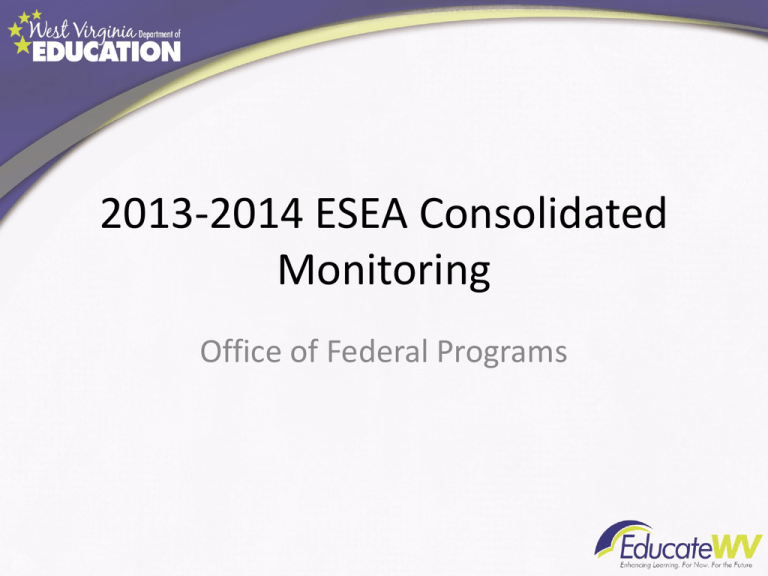
2013-2014 ESEA Consolidated Monitoring Office of Federal Programs ESEA Fiscal and Program Compliance • • • • General Education Provisions Act Sec. 440(a) Section 80.40 of EDGAR A-102 Common Rule and OMB Circular A-110 OMB Circular 133 Subpart D--Federal Agencies and Pass-Through Entities Responsibilities ESEA Consolidated Monitoring • • • • • Title I Title II Title III Title VI (RLIS) McKinney Vento Two – Phase ESEA Compliance Monitoring Process • Risk Assessment Criteria Approach to Identify LEAs for ESEA Compliance Monitoring - Phase One: Cyclical Monitoring Process - Phase Two: On-site Technical Assistance Monitoring Note: Not all Counties will receive both Phases of Monitoring Phase One: Cyclical Monitoring Process • Initiated during the 2013-14 year • Utilizes Risk Assessment to Establish a FiveYear Schedule concluding in 2017-2018 • 11 LEAs Monitored Annually through a DeskAudit Process • The LEA will Electronically Upload Compliance Documentation to the HQSDCS as Outlined by the ESEA Consolidated Monitoring Indicators Phase One: Review and Reporting • SEA Staff will Review the LEA Uploaded Documentation • SEA Monitoring Lead will Schedule a Teleconference with the LEA to Discuss and Verify Documentation • A Monitoring Report will be Provided to the LEA within 60 days of the Documentation Submittal • The LEA will have 30 Business Days to Respond to the Monitoring with Corrective Action Plans Phase One: Appeals Process • LEA May Appeal if Evidence of a Finding is Inaccurate • Submitted in Writing within 30 days of Receipt of the Monitoring Report • Documentation to Support Appeal Must be Submitted to WVDE with the Response Phase Two: On-Site Technical Assistance Monitoring • Based on Annual Risk Assessment Rakings • A Maximum of Five On-Site Monitoring Visits will be Conducted Each Year* • Counties with a Rating of 13 or Higher May Receive an OnSite Visit this Year • Scheduled at a Mutually Convenient Time • Purpose: to Develop a Plan for Addressing Concerns from Monitoring Report (no school visits will be conducted) *Note that monitoring for specific program issues may be conducted at any time at the discretion of WVDE in response to written complaint/concern received by WVDE, Office of Federal Programs Phase Two: Preparation for Visit • WVDE Team Leader will Collaborate with the LEA’s Designated Lead to Develop a Schedule • The WVDE Team Leader will Confirm the Schedule at Least One Month prior to the OnSite Visit Phase Two: Activities During the On-Site Visit • On-Site will Focus on Clarification of Compliance Concerns and Technical Assistance for Corrective Action from Desk Audit • Documentation for Each Year Since Last Monitoring • Availability of Appropriate LEA Staff • Development of a One-Year Workplan to Prioritize Correction of Non-Compliance and Identify Technical Assistance Phase Two: On-Site Monitoring Report • The Workplan Developed During the On-Site Visit will form an Addendum to the Report Compiled During the Desk Audit. • The Report will be issued Electronically to the LEA by WVDE within 30 Business Days of the On-Site Visit. • A Written Acknowledgement of the On-Site Addendum Shall be Provided by the LEA with the Signature of LEA Superintendent Questions? High Quality Schools Data Collection System for Uploading Monitoring Documentation LEA Indicator Document ESEA Compliance Indicators • Organized under Seven West Virginia Standards for High Quality Schools • Three Forms of Verification -Interview Questions (Teleconference) -WVEIS Data (Reviewed Internally by WVDE) -Documentation in HQSDCS (Uploaded by LEA for Desk Audit) Questions? General Topics • • • • • • • 5-17 Report Sequestration Reading by 3rd Grade Educator Evaluation Professional Development Building LEA Capacity for School Improvement Parent Involvement Themes • Maximize Impact of Program Funds • Reduce the burden of compliance planning requirements that do not add value Goals • To network to increase idea base for program planning • To provide input to the SEA regarding ways to support the two identified themes Guiding Questions • How can we improve our leadership structures to accomplish our curriculum and instruction goals? • How do we improve capacity and human capital? • How do we effectively engage all stakeholders? • How can we maximize personnel to achieve our intended program impact? Task • In 15 minutes generate one program planning idea/issue that you would like to pursue through network problem-solving
